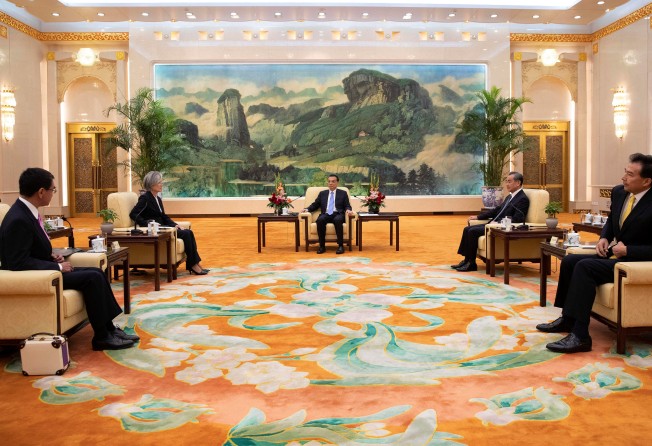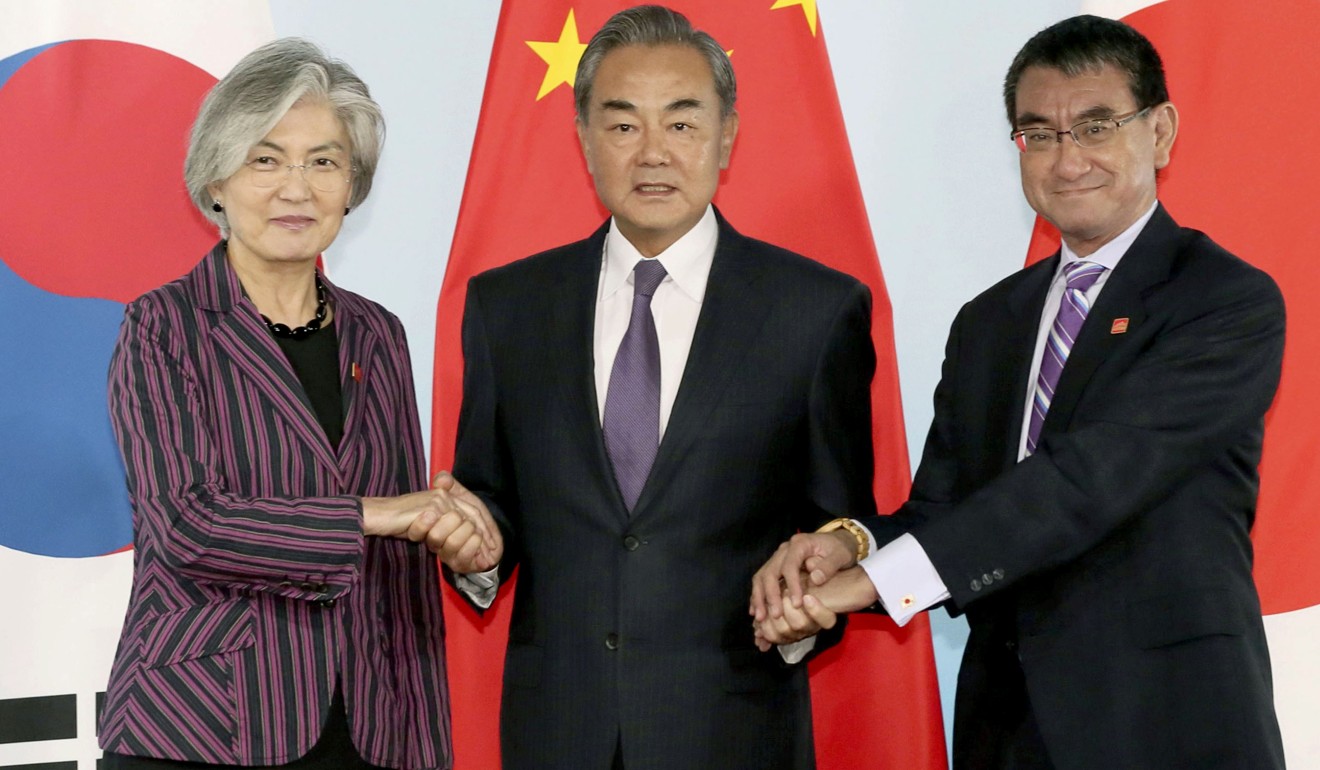Premier Li Keqiang says a China-South Korea-Japan trade deal will safeguard peace and stability in Asia
- Seoul and Tokyo are urged to deal ‘appropriately’ with ‘sensitive’ possibility of new US weapons systems in Asia at foreign ministers’ meeting in Beijing
- Three days of talks between foreign ministers and with promise to work towards greater economic cooperation

China, South Korea and Japan ended three days of foreign ministers’ talks in Beijing on Thursday with a promise to work towards greater economic cooperation, but there was no joint statement on the possibility of new US missiles in Asia or denuclearisation of the Korean peninsula.
Chinese Foreign Minister Wang Yi, along with his South Korean and Japanese counterparts Kang Kyung-wha and Taro Kono, met Chinese Premier Li Keqiang at the Great Hall of the People.
“There is certainly political will from the three parties to speed the negotiations on a free-trade agreement,” said Jun Saito, deputy press secretary of Japan’s ministry of foreign affairs, adding that any agreement had to uphold higher standards (more open markets) than the proposed 10-nation Regional Comprehensive Economic Partnership.
Li called for Seoul and Tokyo’s support in promoting multilateralism, and he reiterated China’s commitment to speeding up their negotiations.
“China-South Korea-Japan cooperation is an important safeguard and catalyst for the region and the world. We must defend regional peace and stability, the multilateral trading system and [the principles] of free trade,” Li said.
The premier continued that a free trade deal would enable fairer competition and that China should play an important role in promoting cooperation between the three countries and throughout East Asia.
His remarks were particularly pointed as South Korea and Japan, two of the biggest US allies in East Asia, are currently embroiled in a trade conflict, which has seen Japan remove South Korea from its list preferred trade partners – a measure that takes effect next week.
Wei Jianguo, a former Chinese vice commerce minister, said a three-way agreement would provide a platform for South Korea and Japan to settle their current dispute, which has its roots in Japan’s colonial history.
Tokyo insists it has fulfilled its obligations under a 1965 treaty, but a South Korean court recently ruled that Japanese firms must compensate victims of wartime forced labour.
“The current global system is under the heavy influence of US protectionism and unilateralism, and no country can remain undamaged,” Wei said.
“It is necessary to promote the trilateral FTA and move towards a rules-based system, rather than being victims of the unilateral trade protectionism.”
Li also alluded to Beijing’s concerns about the possibility of new US intermediate-range missiles being stationed in neighbouring countries, and he called on Seoul and Tokyo to think hard about any such proposal.
“We should also have a corresponding role in safeguarding regional and global peace … We should deal with sensitive issues appropriately so that [trilateral] cooperation can be taken to a higher level,” Li said.

Beijing has warned that the presence of US missiles in South Korea and Japan may complicate their relationship.
China recently threatened unspecified countermeasures if its neighbours allowed the US weapons on their territory.
Kang said that South Korea and China must continue to work together towards greater economic cooperation, a statement from the foreign ministry in Seoul said, without referring to security matters.
The three countries did not reveal how the denuclearisation of North Korea might be achieved, but Japan’s foreign ministry said it remained a common goal.
A source familiar with China-Japan relations said that the two countries were “not in the same boat” on North Korea.
Tokyo demands the complete, verifiable and irreversible dismantling of Pyongyang’s nuclear programme, but Beijing wants economic cooperation with North Korea by easing sanctions, the source said.
Additional reporting by Catherine Wong